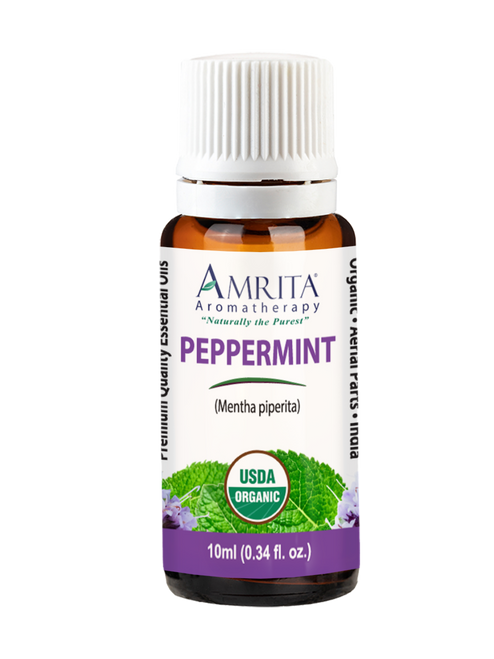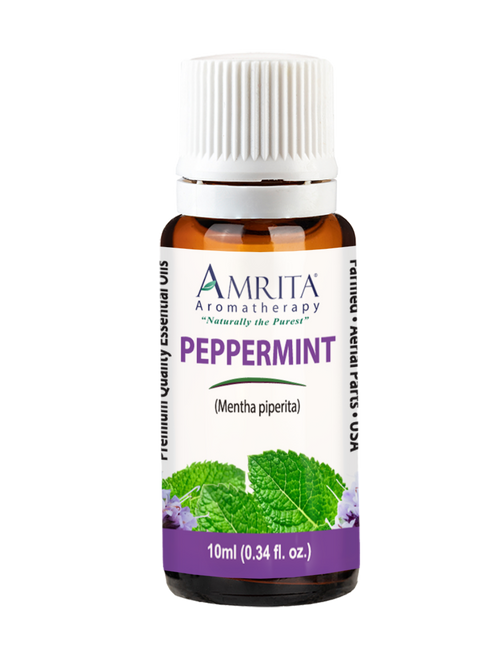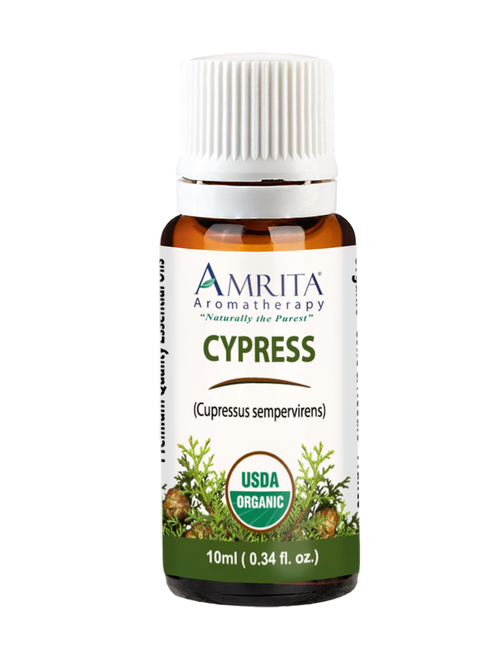- Other Names
- Brandy Mint, Black Mint, Balm Mint, and Candy Mint
- Farming Method
- Certified Organic
- Plant Part
- Aerial Parts
- Country of Origin
- India
- Application Method
- Bath, Diffusion, Inhalation, Massage, and Topical
- Scientific Name
- Mentha piperita
- Extraction Method
- Steam Distilled
Peppermint Organic Essential Oil is one of the world's most widely recognized, celebrated, and versatile Essential Oil, with a host of practical benefits for daily living. Its invigoratingly fresh, sharp, sweet, minty aroma can help bring mental clarity and focus as it helps combat “brain fog”.* It does this not only through aromatic stimulation, but by chemically encouraging healthy blood supply to the brain and preventing circulatory congestion, which dually helps to prevent headaches and/or migraines.* But that’s only the beginning of Peppermint’s long list of abilities!
Peppermint can help the digestive system on a number of different levels. It soothes nausea, deters cramps and colonic spasms, and relieves flatulence.* It makes perfect sense that many restaurants offer complimentary peppermints to their patrons at the end of a meal! These effects also translate into relief from other uncomfortable ailments such as motion sickness, gall bladder inflammation, and GI tract issues.* Additionally, Peppermint can assist the respiratory and lymphatic systems by encouraging healthy functions.
About the Plant:
Peppermint (Mentha piperita) is a hybrid between Spearmint and Watermint. A hardy, hybrid perennial, it thrives easily and needs very little encouragement to grow year after year. The stems are often red and smooth, though some are green and hairy, with a maximum height of about 3 feet. The leaves are oval and also hairy at times, framing beautiful purple or pink flowers which bloom in the summertime. Peppermint’s leaves are often snipped to steep in teapots and to adorn summer fruit salads, which burst with flavor as a result.
The first half of Peppermint’s botanical name, Mentha, references the ancient Greek nymph, Mintha, who is said to have attracted the lustful eye of Hades. Persephone, Hades’ wife, became jealous and placed a curse on Mintha which transformed her into a “weed” below mankind’s feet. Hades then tried to soften the curse, to some extent, by endowing his now leaf-stricken crush with a pleasant scent for all to love.
Piperita, part of its botanical name, is linguistically tied to “pepper”, which is somewhat appropriate considering the potent, spicy aroma derived from its unique combination of natural compounds.
Where It Grows:
The origins of Peppermint are hard to pinpoint because it thrives easily in many regions throughout the world. Many botanists think it may have originated somewhere along the Mediterranean due to the amount of Peppermint coming from those regions. Peppermint currently grows on every continent in the world, except for Antarctica. It prefers temperate climates where plenty of rain meets well-drained soil with high nutrient content. To learn more about Amrita source for Peppermint, please read below where Dr. Streicher discusses this in more detail.
Traditional Uses and Lore:
The earliest evidence we have for use of Peppermint comes from Ancient Egypt, though its origins likely precede written history. Ancient Egyptian medical texts, dating back to 1550 B.C., indicate that it was used as a common treatment for stomach ailments.* 3,000-year-old Peppermint leaves have been discovered within the inner chambers of the pyramids. Peppermint oil was valuable enough to be used as currency at times in Ancient Egypt. Peppermint is a hallmark of traditional medicine, historically used for pain relief, indigestion, sore throat, and other common complaints.*
Pliny, an Ancient Roman scientist and historian, wrote of Greek and Roman use of peppermint, though it is sometimes difficult to discern exactly what plant species was being referred to. This is because there was no distinction at that time between Spearmint, peppermint, and possibly others. Ancient Greeks and Romans were said to have worn Peppermint headdresses for ceremonies and celebrations, as well as use it as flavoring for sauces and wine.
Peppermint is also mentioned in the Bible as a currency for tithing, as well as in 13th century Icelandic pharmacopeia where it is indicated as a popular herbal remedy. In the Middle Ages, monks used it as tooth polish. Around the same time, cheesemakers began to discover that a strong scent of Peppermint could deter mice from their storerooms.
When European settlers came to America, they encountered a native population that was already familiar with the importance of Peppermint. In 1696, English botanist John Ray distinguished Peppermint as separate from Spearmint and other similar species. This distinction gradually led to our modern-day knowledge of the therapeutic potential for Peppermint and its Essential Oil.
Other Facts:
-
-
- Scent: Fresh, Strong, and Minty-Sweet Aroma
- Fragrance Note: Top Note
- Composition: Menthol, Menthone, 1.8 Cineole, Methyl Acetate, Methofuran, Isomenthone, Limonene, β-Pinene, α-Pinene, Germacrene-D, Trans-Sabinene Hydrate, and Pulegone
- Family: Lamiaceae or Labiatae Family
-
Dr. Streicher Says:
This organic Peppermint from India was a great find for us. It is as fine as the finest French Peppermint, yet it comes at an affordable price. It is a 100% pure and natural Peppermint, with no menthol from Cornmint added—a common practice in India.
As you may know, poor-quality Peppermint can have a harsh tone. Amrita’s organic Peppermint is so fine, it almost has a floral note to it. We believe the more pleasing an Essential Oil is, the more the mind-body can open up to it, and then healing takes place.
*These statements have not been evaluated by the Food and Drug Administration. These products are not intended to diagnose, treat, cure, or prevent any disease.
- USDA Certified Organic
- Improves Mental Clarity
- Supports Healthy Digestion
- Alleviates and Relaxes Muscle Tissues
- Click here to read Amrita's blog: All About Peppermint Organic Essential Oil
- Check out the tabs below to learn more about Peppermint
Topical Application (for use on the skin):
|
||||
|
|
||||
|
|
Diffusion / Inhalation Application (add a few drops to a nebulizer or nasal inhaler):
|
|
-------------------------------------------------------------------------------------------------------------------------------------------------------------------
Blends Well With:
-------------------------------------------------------------------------------------------------------------------------------------------------------------------
Safety Precautions:
-
- Peppermint Essential Oil is non-toxic and non-irritant, except in undiluted concentration.
- The menthol contained in Peppermint is a dermal irritant; so avoid contact with eyes, skin, and mucous membranes.
- May cause sensitization in some individuals.*
- Peppermint is a stimulating oil; therefore, it is not advised for use in the evening or at bedtime, as it may cause insomnia.*
- Peppermint Essential Oil should not be used with children who are 3 years of age or younger.*
- Peppermint Essential Oil is non-toxic and non-irritant, except in undiluted concentration.
General Precautions:
-
- Use Essential Oils only in diluted form on the skin and never internally.
- Always be careful when using Essential Oils with children.
- Give them only low doses, or better, consult a qualified aromatherapy expert before using.
- Also, use Essential Oils with care and only under the proper guidance of an expert while pregnant or if you have liver damage, epilepsy, cancer, or other serious health problems.
*These statements have not been evaluated by the Food and Drug Administration. These products are not intended to diagnose, treat, cure, or prevent any disease.
The legendary aroma of Peppermint is immediately recognizable and almost universally enjoyed by all who encounter it. Energizing and rejuvenating for the mind and body, it is highly regarded as an effective tool for providing clarity and focus.* More subtly, it has been credited with the ability to help users quell the ego, defeat feelings of inferiority, and enhance receptive capabilities for ideas and inspiration.* It’s not all just “in the mind” however, as Peppermint Essential Oil contains impressive analgesic and vasoconstrictive properties which work hand in hand to deter headaches, migraines, muscle pain, and joint pain.*
A broad range of stomach ailments can also be alleviated and/or eliminated with Peppermint Essential Oil. It stimulates proper digestion while simultaneously mitigating nausea and relieving flatulence.* Many who suffer from motion sickness, especially while driving or flying long distances, have found it to be an essential part of their travel kit.* Additionally, the antispasmodic and emmenagogue actions of Peppermint help to alleviate gall bladder cramping, menstrual and menopausal cramping, and gastrointestinal issues.*
Peppermint Essential Oil can tackle respiratory symptoms associated with common cold or flu, lung congestion, and sinus inflammation and infection.* Additionally it can be used on the skin, if properly diluted, to assist with symptoms such as itching, redness, irritation, and/or pain caused by acne, eczema, and otherwise.* Lastly, it is known to increase blood flow to the spleen, which helps the lymphatic system to perform optimally.* Peppermint’s broad range of therapeutic benefits leaves virtually no question as to whether or not the average user stands to benefit from adding it to their Essential Oil toolkit.
The following is a list of conditions which Peppermint Essential Oil addresses by category:
|
|
|
|
*These statements have not been evaluated by the Food and Drug Administration. These products are not intended to diagnose, treat, cure, or prevent any disease.
Bottles are filled by volume. Some bottle sizes may not be filled to the top, but do contain the volume of oil specified.
|
Click the links below to view GC Analysis: |
Click the links below to view CoA Analysis: |
|
Click the link below to view Safety Data Sheet (SDS): |












